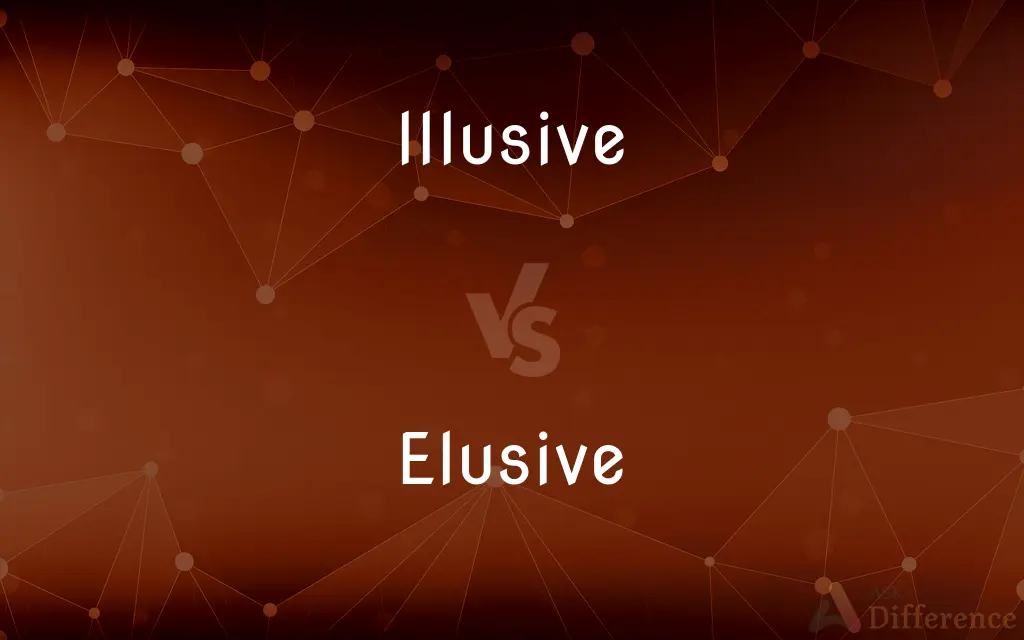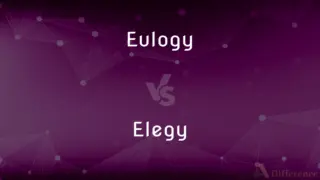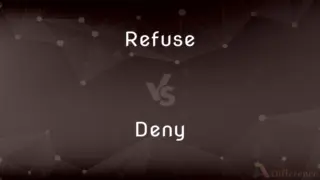Illusive vs. Elusive — What's the Difference?
Edited by Tayyaba Rehman — By Fiza Rafique — Updated on November 1, 2023
Illusive refers to something deceptive or based on illusion, while elusive implies something hard to grasp, catch, or achieve.

Difference Between Illusive and Elusive
Table of Contents
ADVERTISEMENT
Key Differences
The term "illusive" is rooted in illusion, meaning something that deceives or misleads the senses or mind. It often relates to things that are not what they seem. Conversely, "elusive" describes something that evades understanding, capture, or attainment. It's commonly used for things that are difficult to grasp, physically or metaphorically.
Illusive phenomena are often based on false appearances or deceptions, like a mirage in a desert. They trick the observer into believing something unreal. On the other hand, elusive things are real but challenging to obtain, understand, or define. An elusive person, for instance, is hard to find or understand.
In literature, illusive elements may refer to imaginary or fantastical aspects that mislead characters or readers. Elusive elements, however, often pertain to elusive themes or characters that are complex and hard to comprehend fully.
The illusive nature of something implies an inherent trickery or falseness. In contrast, the elusive nature of something doesn't imply deceit; instead, it highlights the difficulty in capturing or understanding it.
While illusive often carries a negative connotation associated with deception, elusive is more neutral, primarily indicating the challenging nature of something or someone.
ADVERTISEMENT
Comparison Chart
Definition
Pertaining to deception or illusion.
Hard to grasp, catch, or achieve.
Connotation
Often negative, implying trickery.
Neutral, indicating difficulty.
Usage in Literature
Refers to deceptive or fantastical elements.
Used for complex, hard-to-understand themes or characters.
Real vs. Unreal
Associated with unreal or imaginary aspects.
Real but challenging to attain or understand.
Common Associations
Mirages, magic tricks, illusions.
Quick-moving animals, complex ideas, shy individuals.
Compare with Definitions
Illusive
Deceptive or misleading.
The magician's illusive tricks left the audience in awe.
Elusive
Tending to evade grasp or pursuit.
The elusive answer to the problem frustrated her.
Illusive
Based on illusion or fantasy.
The illusive world in the novel captivated readers.
Elusive
Hard to grasp or understand.
The concept remained elusive to most students.
Illusive
Creating a false impression.
His illusive promises never materialized into reality.
Elusive
Difficult to catch or achieve.
The elusive butterfly evaded capture.
Illusive
Appearing real but actually false.
The oasis was illusive, just a mirage in the desert.
Elusive
Evasive or hard to find.
The criminal was elusive, always one step ahead of the law.
Illusive
Resembling or characteristic of an illusion.
The painting's illusive depth tricked the eye.
Elusive
"Elusive" was the first single for British singer-songwriter Scott Matthews and was released on 18 September 2006. The single received much airplay from BBC Radio DJs Jo Whiley, Dermot O'Leary and Zane Lowe between 7 and 10 August.
Illusive
Illusory.
Elusive
Tending to elude capture, perception, comprehension, or memory
"an invisible cabal of conspirators, each more elusive than the archterrorist [himself]" (David Kline).
Illusive
Subject to or pertaining to an illusion, often used in the sense of an unrealistic expectation or an unreachable goal or outcome.
Testing software completely is an illusive goal.
Elusive
Difficult to define or describe
"Failures are more finely etched in our minds than triumphs, and success is an elusive, if not mythic, goal in our demanding society" (Hugh Drummond).
Illusive
Deceiving by false show; deceitful; deceptive; false; illusory; unreal.
Truth from illusive falsehood to command.
Elusive
Evading capture, comprehension or remembrance.
The elusive criminal was arrested
Illusive
Based on or having the nature of an illusion;
Illusive hopes of of finding a better job
Secret activities offer presidents the alluring but often illusory promise that they can achieve foreign policy goals without the bothersome debate and open decision that are staples of democracy
Elusive
Difficult to make precise.
Elusive
Rarely seen.
Elusive
Tending to elude; using arts or deception to escape; adroitly escaping or evading; eluding the grasp; fallacious.
Elusive of the bridal day, she givesFond hopes to all, and all with hopes deceives.
Elusive
Difficult to describe;
A haunting elusive odor
Elusive
Skillful at eluding capture;
A cabal of conspirators, each more elusive than the archterrorist
Elusive
Be difficult to detect or grasp by the mind;
His whole attitude had undergone a subtle change
A subtle difference
That elusive thing the soul
Elusive
Difficult to remember or recall.
The elusive name was on the tip of my tongue.
Common Curiosities
Can illusive be used positively?
It's typically used negatively, but can be positive in the context of art or entertainment.
Can ideas be illusive?
Yes, if they are based on false or deceptive notions.
What does illusive mean?
Illusive means deceptive or based on illusion.
Is elusive always negative?
No, elusive is neutral and often used to describe challenges.
Can something be both illusive and elusive?
Rarely, as they imply different things: deception vs. difficulty.
Are illusive and elusive interchangeable?
No, they have distinct meanings and are not interchangeable.
How is illusive used in literature?
To describe deceptive or fantastical elements.
Can a person be described as illusive?
Yes, if they are deceptive or misleading.
What does elusive mean?
Elusive means hard to grasp, catch, or achieve.
How is elusive used in literature?
For complex themes or characters that are hard to understand.
Can ideas be elusive?
Yes, if they are difficult to grasp or fully comprehend.
Is elusive a negative trait for a person?
Not necessarily, it can simply mean they are private or hard to understand.
Are illusive and elusive synonyms?
No, they are not synonyms and have different meanings.
Can a person be described as elusive?
Yes, if they are hard to find, understand, or define.
Is illusive related to magic?
Yes, it's often used to describe magical or illusory tricks.
Share Your Discovery

Previous Comparison
Eulogy vs. Elegy
Next Comparison
Refuse vs. DenyAuthor Spotlight
Written by
Fiza RafiqueFiza Rafique is a skilled content writer at AskDifference.com, where she meticulously refines and enhances written pieces. Drawing from her vast editorial expertise, Fiza ensures clarity, accuracy, and precision in every article. Passionate about language, she continually seeks to elevate the quality of content for readers worldwide.
Edited by
Tayyaba RehmanTayyaba Rehman is a distinguished writer, currently serving as a primary contributor to askdifference.com. As a researcher in semantics and etymology, Tayyaba's passion for the complexity of languages and their distinctions has found a perfect home on the platform. Tayyaba delves into the intricacies of language, distinguishing between commonly confused words and phrases, thereby providing clarity for readers worldwide.














































